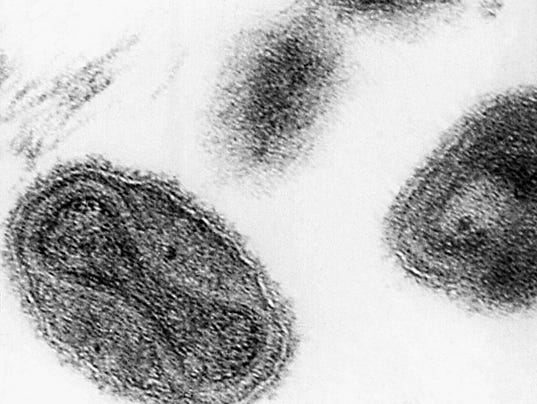Results 1 to 1 of 1
Thread Information
Users Browsing this Thread
There are currently 1 users browsing this thread. (0 members and 1 guests)
-
07-08-2014, 03:10 PM #1
Forgotten vials of smallpox found in Bethesda, Md.
Forgotten vials of smallpox found in Bethesda, Md.
Liz Szabo, USA TODAY1:50 p.m. EDT July 8, 2014

(Photo: Uncredited AP)
Scientists last week discovered several vials of smallpox — one of the deadliest diseases known to man — in an unused storage room at the National Institutes of Health in Bethesda, Md., according to officials at the Centers for Disease Control and Prevention.
Officials say there's no health risk from the vials — either to NIH employees or the public. The vials of smallpox, which apparently date from the 1950s, were "immediately secured" in a CDC containment lab, according to a CDC statement. NIH officials alerted the CDC about the smallpox July 1.
Smallpox killed about one-third of its victims. It devastated populations around the world for at least 3,000 years until being officially eradicated by vaccines in 1980. There is ongoing concern that smallpox could be used in a bioterrorist attack.
The smallpox samples were found in a lab run by the Food and Drug Administration. Scientists discovered the vials when preparing to move to the FDA's main campus in Silver Spring, Md.
A government aircraft took the smallpox vials to CDC's high-containment facility in Atlanta on Monday, according to the CDC statement. Overnight genetic testing in a top-security lab confirmed that the vials did indeed contain smallpox, but CDC officials say they will need to do additional tests to find out whether the smallpox is viable or able to reproduce and spread. Testing could take up to two weeks.
CDC scientists will destroy the smallpox samples after finishing the tests.
The World Health Organization has designed two storage sites for smallpox, one at the CDC in Atlanta and one at the State Research Center of Virology and Biotechnology (VECTOR) in Novosibirsk, Russia. The WHO oversees the inspection of both facilities and certifies their safety and security.
CDC has alerted WHO about the discovery and has invited the WHO to join its investigation of how the smallpox wound up in Bethesda. If the vials contain viable smallpox, the CDC will invite WHO officials to witness their destruction, the usual practice when smallpox has been found outside of official storage sites, the CDC says.
The CDC's Division of Select Agents and Toxins and the Federal Bureau of Investigation are investigating how the smallpox vials were originally prepared and stored in Bethesda.
http://www.usatoday.com/story/news/n...room/12363365/
NO AMNESTY
Don't reward the criminal actions of millions of illegal aliens by giving them citizenship.
Sign in and post comments here.
Please support our fight against illegal immigration by joining ALIPAC's email alerts here https://eepurl.com/cktGTn
Similar Threads
-
160,000Flu Shots Recalled: Particles Seen Floating in Vials
By AirborneSapper7 in forum Other Topics News and IssuesReplies: 0Last Post: 01-12-2013, 05:40 AM -
310 vials of 'date rape' drug found in vehicle trying to enter U.S.
By JohnDoe2 in forum illegal immigration News Stories & ReportsReplies: 4Last Post: 10-24-2012, 12:42 PM -
Endangered Mushroom Could Cure Smallpox, TB, Bird Flu
By carolinamtnwoman in forum Other Topics News and IssuesReplies: 1Last Post: 12-31-2009, 02:41 AM -
Van Hollen D-(MD) 8th Dist. to speak in Bethesda tomorrow!
By Zach1776 in forum General DiscussionReplies: 0Last Post: 05-07-2006, 09:14 PM -
Md. Man Accused Of Document Fraud (Bethesda Naval Stn)
By AuntB in forum illegal immigration News Stories & ReportsReplies: 3Last Post: 01-01-2006, 12:50 AM


 LinkBack URL
LinkBack URL About LinkBacks
About LinkBacks




 Reply With Quote
Reply With Quote


Watch: Paul, Hawley Torch Mayorkas To His Face On Laken Riley's...
04-19-2024, 02:32 PM in illegal immigration News Stories & Reports